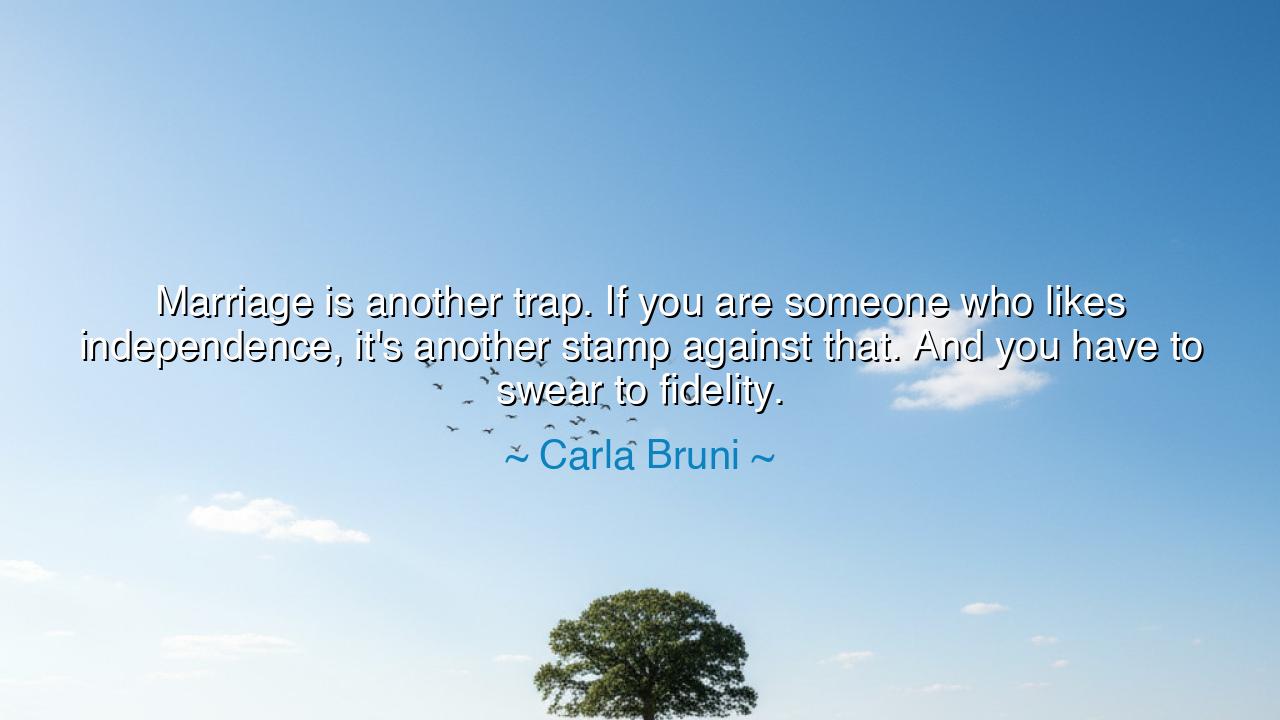
Marriage is another trap. If you are someone who likes
Marriage is another trap. If you are someone who likes independence, it's another stamp against that. And you have to swear to fidelity.






Listen closely, O children of the future, for the words of Carla Bruni carry a deep reflection on the nature of marriage, independence, and the complexities of human connection. She declares, "Marriage is another trap. If you are someone who likes independence, it's another stamp against that. And you have to swear to fidelity." These words speak to a universal truth—the tension between the desire for freedom and the commitments that come with close, binding relationships. Bruni recognizes that marriage, while a sacred bond, can sometimes feel like a surrender of personal autonomy, a choice that places obligations and vows on an individual’s soul. Yet, like all great truths, it is filled with both beauty and complexity.
In the ancient world, the concept of marriage was seen as both a personal choice and a social contract. The Greeks, for example, viewed marriage as a cornerstone of both family and society. Plato, in his work The Republic, spoke of marriage not as a personal affair, but as a tool to ensure the continuation of the state. For him, the bond of marriage was one of duty, a responsibility not just to one’s partner but to the broader community. In this view, marriage was a means of reinforcing societal stability, where the individual sacrificed part of their freedom for the greater good. But there was always a tension between personal independence and the collective responsibilities that marriage demanded.
Similarly, in ancient Rome, marriage was often seen as a contract, especially among the patricians. The Romans believed that marriage was essential for producing heirs and ensuring the continuation of family legacies. Cicero, the great Roman statesman, often wrote about the duties of marriage, not the personal freedoms it might offer. For the Romans, fidelity in marriage was of utmost importance, and the vows exchanged were seen as sacred. But, as Bruni suggests, there was an underlying trap in this commitment. The Roman matrons were bound by their duties, and their independence was often sacrificed in the service of the family and the empire.
Bruni’s words remind us that marriage has always been a complex matter, balancing the freedom of the individual with the fidelity expected within the relationship. Fidelity—a sacred promise to remain true, not just in body but in spirit—can feel like a cage for those who hold independence dear. It is a promise to another, one that asks the individual to set aside certain personal desires for the sake of the relationship. While this bond can bring great love and stability, it also requires sacrifice, and Bruni’s reflection on this highlights the inner conflict many feel between personal freedom and the commitment of love.
Consider, O children, the story of Penelope in Homer’s Odyssey. She was the wife of Odysseus, who was lost at sea for many years. Despite the many suitors who came to her door, claiming that her husband was dead, Penelope remained faithful to her husband, swearing to wait for his return. Her fidelity was a mark of her love and devotion, yet it also marked a sacrifice of her own desires. Her independence was held in tension with the duties she had taken on, and she spent years in solitude and uncertainty. Her story is one of the eternal struggle between personal freedom and the obligations that come with love, a struggle that Bruni captures with her mention of the trap of marriage.
The lesson from Bruni’s words, then, is one of balance. Marriage is not inherently a trap, nor is independence the only path to personal fulfillment. Rather, it is the balance between the two that defines the human experience. Fidelity is a noble and beautiful thing, but it requires sacrifice. The key is to understand the nature of commitment and to enter it not as a cage, but as a conscious choice, one that honors both the union and the individual. The ancients knew that love and duty could coexist, but they also recognized that true freedom comes from within—whether in the context of marriage or in solitude.
Take this wisdom into your own lives, O heirs of the future: marriage and fidelity are sacred, but so is the independence that allows you to remain whole as a person. Seek to understand the true meaning of commitment, and enter into it not with the idea of losing yourself, but of growing together with another. And if you choose the path of independence, remember that it too comes with its own sacrifices. In all things, seek balance. Let your relationships empower you, not diminish you, and let your personal freedom be guided by love and responsibility, not isolation or fear. In this way, you will find that both fidelity and independence can coexist, and through this, you will learn the deeper truth of what it means to be truly free.






AAdministratorAdministrator
Welcome, honored guests. Please leave a comment, we will respond soon